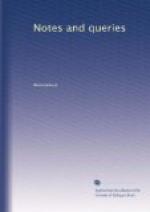“You may break, you may ruin the
vase if you will,
But the scent of the roses will cling
round it still.”
Now the couplet appears in its original beauty.
It is impossible to speak of the poets without thinking of Shakspeare, who towers above them all. We have yet to discover an editor capable of doing him full justice. Some of Johnson’s notes are very amusing, and those of recent editors occasionally provoke a smile. If once a blunder has been made it is persisted in. Take, for instance, a glaring one in the 2nd part of Henry IV., where, in the apostrophe to sleep, “clouds” is substituted for “shrouds.”
“Wilt thou, upon the high and giddy
mast,
Seal up the ship-boy’s eyes, and
rock his brains
In cradle of the rude imperious surge,
And in the visitation of the winds,
Who take the ruffian billows by the top,
Curling their monstrous heads, and hanging
them
With deafening clamours in the slippery
clouds,
That with the hurly death itself awakes?”
That shrouds is the correct word is so obvious, that it is surprising any man of common understanding should dispute it. Yet we find the following note in Knight’s pictorial edition:—
“Clouds.—Some
editors have proposed to read shrouds.
A line
in Julius Caesar makes Shakspere’s
meaning clear:—
“’I
have seen
Th’ ambitious ocean swell, and rage,
and foam,
To be exalted with the threatening clouds.’”
Clouds in this instance is perfectly consistent; but here the scene is altogether different. We have no ship-boy sleeping on the giddy mast, in the midst of the shrouds, or ropes, rendered slippery by the perpetual dashing of the waves against them during the storm.
If in Shakspeare’s time the printer’s rule of “following copy” had been as rigidly observed as in our day, errors would have been avoided, for Shakspeare’s MS. was sufficiently clear. In the preface to the folio edition of 1623, it is stated that “his mind and hand went together; and what he thought he uttered with that easinesse that wee have scarse received from him a blot in his papers.”
D***N**R.
8th Nov. 1849.
* * * * *
HERBERT AND DIBDIN’S AMES.
BORDE’S BOKE OF KNOWLEDGE—BOWLAND’S CHOISE OF CHANGE—GREENE’S ROYAL EXCHANGE.
Mr. Editor,—I am induced to mention the following misstatement in Herbert’s edition of Ames’ Typographical Antiquities, enlarged by Dibdin, not by its importance, but by its supplying an appropriate specimen of the benefits which would be conferred on bibliography by your correspondents complying with Dr. Maitland’s recommendations.




